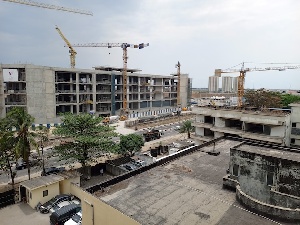Africa News of Friday, 16 May 2025
Source: www.ghanawebbers.com
Africa: Young Africans Priced Out of Cities As Urban Housing Crisis Deepens
Jeremiah Achimugu's Struggles in Abuja
Jeremiah Achimugu graduated in 2019. He left Sokoto State for Abuja, Nigeria's capital. He sought better opportunities but faced unexpected challenges. The high cost of housing was particularly difficult.
Initially, Achimugu lived with his uncle. He worked as a marketer and earned 120,000 naira (USD 73) monthly. However, this salary barely met his basic needs. "The cost of living soon ate deep into my salary," he said. By month’s end, he was always broke.
When he searched for his own place, he was shocked by the prices. A small one-room apartment in a remote area costs about 500,000 naira (USD 307) yearly. "I couldn't afford that kind of rent," he said. A few months later, he resigned and returned to Sokoto.
Achimugu's dream of city life ended due to high living costs. "Rent is too high for young people," he stated. Many landlords exploit newcomers by raising rents.
A Broader Housing Crisis
Achimugu's experience highlights a larger issue in Nigeria. About 63 percent of the population is under 24 years old. Cities are growing rapidly, but housing hasn't kept pace. The United Nations warns that urban populations are increasing almost twice as fast as the national average.
As a result, available homes are overpriced. The World Bank estimates Nigeria has a housing shortage of over 17 million homes.
In major cities like Lagos and Abuja, rent ranges from around 400,000 naira (USD 246) to as much as 25 million naira (USD 16,000) annually based on location and type of apartment.
With a minimum wage of just 70,000 naira (USD 43), many young people cannot afford decent housing. This situation makes it harder for them to settle down or feel financially secure.
Challenges Across Africa
Nigeria isn't alone in this crisis; young people across Africa face similar issues. Rapid urbanization and economic hardship have made affordable housing scarce.
Interviews with young people in Ghana, Kenya, South Africa, and Nigeria confirm these challenges exist continent-wide.
Most Africans cannot access formal housing; only the top 5 to 10 percent can afford it. Many live in informal settlements lacking essential services like clean water and electricity.
Experts warn that without investment in affordable housing, more young people will struggle to find homes.
Voices from Ghana and Kenya
Kwantami Kwame from Kumasi blames capitalism for high rents in Ghana. He shared his experience searching for an apartment in Accra: "I was asked to pay two years' rent upfront." The fee didn't cover utilities either.
Kwame believes governments should regulate rents to protect low-income earners like him.
In contrast, Olaitan Olaoye from Lagos argues limited land availability drives up rents instead of greed alone. He believes price controls won't solve the problem without addressing inflation affecting construction costs.
Olaoye worries that if renting is hard now, owning a home may become unrealistic for many young people.
Phoebe Atieno Ochieng from Nairobi also faces challenges after moving there for work with a low salary of just 18,000 Kenyan Shillings (USD 140). Renting is out of her reach; she lives on school premises instead.
She criticizes the Kenyan government for inadequate social housing programs despite launching initiatives aimed at helping low- and middle-income earners secure homes.
Government Failures Across Regions
Similar issues plague Nigeria’s attempts at solving its housing crisis through various programs that often fail due to poor implementation or corruption.
South Africa faces worsening conditions due to rapid urbanization and economic struggles stemming from apartheid legacies.
Many Black South Africans still live in overcrowded townships lacking proper infrastructure while seeking better job opportunities elsewhere.
Despite government efforts at providing subsidized housing for low-income individuals, millions remain without homes.
Ntando Mji from Cape Town notes how difficult it is to find affordable rentals despite government initiatives aimed at helping those with limited income.
Bhufura Majola emphasizes that commercial entities build most houses at high prices.
He urges the South African government to intervene by providing lower-cost accommodations through partnerships with private sectors.
Peace Abiola from Ibadan spent all her savings on an apartment last year but now struggles with rising costs.
"I think we need laws controlling rental price hikes," she said while expressing frustration over unfulfilled promises by Nigerian authorities regarding tenant protections.
"Here we focus on survival—paying rent or getting our next meal," Abiola lamented.











